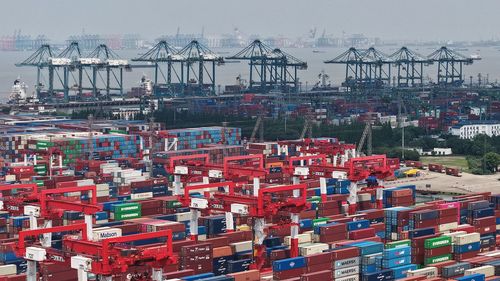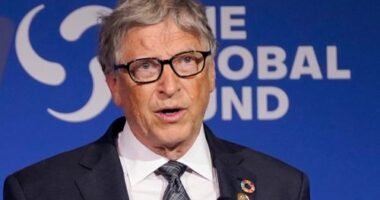Share this @internewscast.com
Trade negotiations between the United States and China are set to extend into tomorrow in London as both countries aim to uphold a fragile agreement reached last month.
The new discussions were planned last week following a much-awaited phone call between US President Donald Trump and Chinese leader Xi Jinping. This call seemed to calm tensions that had heightened in the weeks after an unexpected deal was made in Geneva.
The talks began yesterday and tomorrow will mark the second day, a source told CNN.

Last month, the two sides agreed to drastically roll back tariffs on each other’s goods for an initial 90-day period. The mood was upbeat.
Nevertheless, pessimism quickly arose concerning two key issues: China’s dominance over rare earth minerals and its ability to access semiconductor technology developed in the US.
Beijing’s exports of rare earths and their related magnets are expected to take centre stage at the London talks.
Experts say Beijing is unlikely to give up its strategic grip over the essential minerals, which are needed in a wide range of electronics, vehicles and defence systems.
“China’s control over rare earth supply has become a calibrated yet assertive tool for strategic influence,” said Robin Xing, Morgan Stanley’s chief China economist.
“Its near-monopoly of the supply chain means rare earths will remain a significant bargaining chip in trade negotiations.”
Since the talks in Geneva, Trump has accused Beijing of effectively blocking the export of rare earths, announcing additional chip curbs and threatening to revoke the US visas of Chinese students.

The moves have provoked backlash from China, which views Washington’s decisions as reneging on its trade promises.
All eyes will be on whether both sides can come to a consensus in London on issues of fundamental importance.
US Treasury Secretary Scott Bessent, Commerce Secretary Howard Lutnick and Trade Representative Jamieson Greer will meet a Chinese delegation led by Vice Premier He Lifeng.
Trump has authorised his trade negotiating team, led by Bessent, to ease up on some key export restrictions of US goods to China that the United States had put in place for national security concerns, three sources familiar with the matter told CNN.
It remains unclear exactly what the negotiators will put on the table, but it appears as though the Trump administration will draw the line at some critical technology that the United States maintains is crucial for its competitiveness with China, the world’s second-largest economy.
In exchange for immediately easing or halting some â or perhaps a large number of â export controls, the United States wants China to release high volumes of rare earth materials. On Saturday, Beijing appeared to send conciliatory signals.
A spokesperson for China’s Commerce Ministry, which oversees the export controls, said it had “approved a certain number of compliant applications.”

“China is willing to further enhance communication and dialogue with relevant countries regarding export controls to facilitate compliant trade,” the spokesperson said.
Kevin Hassett, head of the National Economic Council at the White House, told CBS’s Face the Nation on Sunday that the US side would look to restore the flow of rare earth minerals.
“Those exports of critical minerals have been getting released at a rate that is higher than it was, but not as high as we believe we agreed to in Geneva,” he said, adding that he is “very comfortable” with a trade deal being made after the talks.
On Monday morning in an interview with CNBC, Hassett said: “This was a very significant sticking point, because China controls ⦠something like 90 per cent of the rare earths and the magnets.
And if they’re slow rolling, sending those to us because of some licensing deal that they set up, then it could potentially disrupt production for some US companies that rely on those things.”
“And there are enough of those, like, for example, auto companies, that President Trump took it very seriously, called President Xi and said, we got to get this stuff coming out faster. And President Xi agreed,” he added.
Hassett said the Trump administration might be open to loosening restrictions on some microchips that China viewed as critical to its manufacturing sector, although the United States would maintain restrictions on “very, very high-end Nvidia” chips that were capable of powering artificial intelligence systems.

The Biden administration had cut off Chinese access to most AI chips because of national security concerns, and Trump has kept those restrictions in place.
A valuable card to play In April, as tit-for-tat trade tension between the two countries escalated, China imposed a new licensing regime on seven rare earth minerals and several magnets, requiring exporters to seek approvals for each shipment and submit documentation to verify the intended end use of these materials.
Following the trade truce negotiated in Geneva, the Trump administration expected China to lift restrictions on those minerals.
But Beijing’s apparent slow-walking of approvals triggered deep frustration within the White House, CNN reported last month. Rare earths are a group of 17 elements that are more abundant than gold and can be found in many countries, including the US.
But they’re difficult, costly and environmentally polluting to extract and process. China controls 90 per cent of global rare earth processing.
Experts say it’s possible that Beijing may seek to use its leverage over rare earths to get Washington to ease its own export controls aimed at blocking China’s access to advanced US semiconductors and related technologies.
The American Chamber of Commerce in China said on Friday that some Chinese suppliers of American companies had received six-month export licences.
Reuters, citing two sources, also reported that suppliers of major American carmakers â including General Motors, Ford and Jeep-maker Stellantis â were granted temporary export licences for a period of up to six months.
While China may step up the pace of licence approvals to cool the diplomatic temperature, global access to Chinese rare earth minerals will likely remain more restricted than it was before April, according to a Friday research note by Leah Fahy, a China economist and other experts at Capital Economics, a London-based consultancy.
“Beijing had become more assertive in its use of export controls as tools to protect and cement its global position in strategic sectors, even before Trump hiked China tariffs this year,” the note said.
As China tackles a tariff war with the US head-on, it’s clear that the disruptions are continuing to cause economic pain at home.
Trade and price data released on Monday painted a gloomy picture for the country’s export-reliant economy.
Its overall overseas shipments rose by just 4.8 per cent in May, compared to the same month a year earlier, according to data released by China’s General Administration of Customs.

It was a sharp slowdown from the 8.1 per cent recorded in April, and lower than the estimate of 5.0 per cent export growth from a Reuters poll of economists.
Its exports to the US suffered a steep decline of 34.5 per cent.
The sharp monthly fall widened from a 21 per cent drop in April and came despite the trade truce announced on May 12 that brought American tariffs on Chinese goods down from 145 per cent to 30 per cent.
Still, Lü Daliang, a spokesperson for the customs department, talked up China’s economic strength, telling the state-run media Xinhua that China’s goods trade had demonstrated “resilience in the face of external challenges”.
Meanwhile, deflationary pressures continue to stalk the world’s second-largest economy, according to data released separately on Monday by the National Bureau of Statistics (NBS).
In May, China’s Consumer Price Index (CPI), a benchmark for measuring inflation, dropped 0.1 per cent compared to the same month last year.
Factory-gate deflation, measured by the Producer Price Index (PPI), worsened with a 3.3 per cent decrease in May from a year earlier.
Last month’s drop marks the sharpest year-on-year contraction in 22 months, according to NBS data.
Dong Lijuan, chief statistician at the NBS, attributed the decline in producer prices, which measures the average change in prices received by producers of goods and services, to a drop in global oil and gas prices, as well as the decrease in prices for coal and other raw materials due to low cyclical demand.
The high base of last year was cited as another reason for the decline, Dong said in a statement












